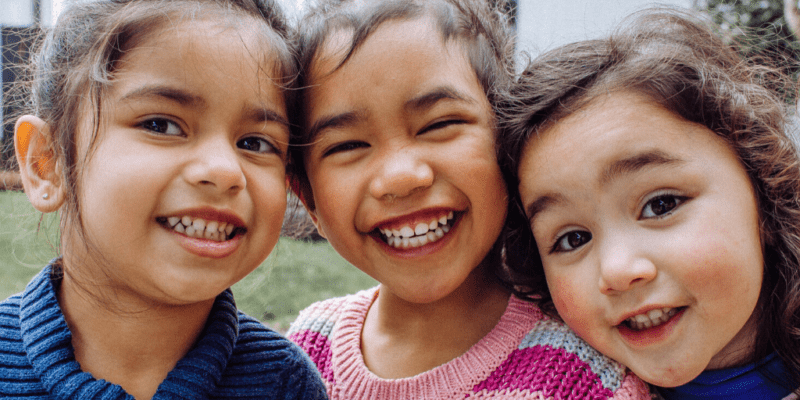There are many reasons parents may want to introduce a new language to their child. Maybe they have family members living abroad. Maybe their child has expressed an interest in learning a new language. Maybe they’re looking for fun new skills to learn at home. And maybe they just want them to be well-rounded members of a global community!
Whatever the reason, many families wonder about the costs and benefits of dual language exposure. After all, kids’ brains are working hard to develop, and learning a new language must have some effect on that process… right? So how exactly does bilingualism affect a child’s brain?
Does Learning a Second Language Cause Confusion in Young Children?
The earliest research on bilingualism in young children in the 1940s and 1950s yielded conclusions that bilingual children were less intelligent than their monolingual peers, due to what some researchers called “mental confusion.” The idea here was that children who were introduced to a new language too early might become confused, and that this would somehow make it more difficult for them to learn in other academic areas too.
Luckily, this theory turned out to be quite false! Issues with the original research surfaced decades later: it was determined that the tests did not truly measure intelligence; that they were often administered in only one language; and that the sample of children studied did not accurately represent the bilingual population. Some weren’t even bilingual at all, but merely assumed to be based on their parents’ names, or countries of birth—hardly determiners of language level.
Nevertheless, the stigma surrounding early dual language exposure still exists, as a result of these faulty conclusions early on. Some parents are hesitant to introduce a new language to their child “too early,” for fear of confusing them or inadvertently causing a learning delay. In reality, exposing children to multiple languages can have enormous benefits for their cognitive development.

The Facts: Bilingualism Helps… A Lot!
As more research surfaces surrounding bilingualism in young learners, we are finding that the benefits of learning a second language go beyond communication. As children’s brains develop, their cognitive functions are working rapidly to improve, and exposure to multiple languages can support this in more ways than one.
Classification and Categorization
As children learn new information, their brains simultaneously develop an important skill: classification. By sorting new knowledge and stimuli into groups, the brain can more easily find it again when necessary.
One prominent child psychologist, Jean Piaget, called these categories “schemas”. According to schema theory, children who are better equipped to categorize new information efficiently will be able to recall and use that information more accurately; in other words, they’ll be better learners.
And, as it turns out, children who have been exposed to a second language are especially skilled at categorization. To use multiple languages requires the ability to access a separate set of vocabulary and syntax based on context; and this ability translates to other schemas, as well.
Executive Function
When it comes to brain development, executive function includes attention, working memory, and cognitive flexibility—or the ability to adapt to a shift in rules or stimuli. This last skill in particular has been shown to be particularly well-developed in children who are familiar with multiple languages.
When examined closely, this is hardly surprising; learners need to be able to recognize and adapt quickly in order to use the appropriate language in context. As an added bonus, it seems that this skill shifts into other areas of learning—not just language. In one study, children as young as 7 months old showed greater cognitive flexibility in a variety of tasks if they’d been exposed to more than one language.
Literacy and Reading Fluency
When children learn multiple languages with similar structures (i.e. English and French), the reading skills they learn in one language can help support their literacy in the other.
As they learn the sounds associated with specific letters, words, and sentence structures, children become more confident readers. The more they practice putting these pieces together, the more fluently they can read—and practicing this skill in two languages, particularly if they share the same basic building blocks, can accelerate literacy.
 Metalinguistic Awareness
Metalinguistic Awareness
Some researchers speculate that dual language learners’ literacy advancement is due to what is called “metalinguistic awareness,” or the ability to recognize rules and patterns within a language. Fluent speakers have strong metalinguistic awareness in their language; they can distinguish between grammatically correct and incorrect sentences.
As it happens, children who are familiar with multiple languages have stronger metalinguistic awareness in either language than those who speak only one. They can identify sentences with incorrect grammar better than their peers, even those with the same level of fluency in that particular language.
Functional Plasticity
As children learn and grow, their brains are extremely malleable—we call this brain plasticity, and it’s crucial for the learning process. The better the brain can grow and change, the more effectively it’s able to learn and develop.
Several studies on multilingual children have determined that any experience with a second language, regardless of the level of fluency, has a positive effect on brain plasticity. Incredibly, these effects were seen even in kids who hadn’t yet practiced using the language; just being exposed to multiple languages was enough.
Theory of Mind
Possibly the most significant area of brain development affected by multilingualism is theory of mind, or the ability to recognize other people’s perspectives and emotions. Most young children develop theory of mind slowly, believing at first that everyone knows and experiences the same thoughts and feelings that they do.
In studies comparing theory of mind in bilingual and monolingual children, the results were remarkably consistent: bilingual children are better able to understand other people’s mental and emotional states.
Similarly, several studies showed that bilingual children can more readily shift their beliefs when presented with new information. Due to sociolinguistic awareness—or understanding of social conventions embedded within language patterns—children with experience in multiple languages accept new information and change their beliefs accordingly. This is an illustration of advanced critical thinking, which many adults haven’t even mastered!
3 Tips to Make the Most of Language Learning Benefits
Okay, okay, you’re convinced—learning a second language has oodles of upsides. So how do you make the most of these positive outcomes?
- Practice Language Every Day. Even if it’s only five minutes, daily exposure can have a huge impact on how well your child retains what they’ve learned.
- Let Kids Lead the Way. If learning a second language is going to be a lifelong skill, your child should feel a sense of ownership in the process. Figure out what it is they want to learn, and go from there!
- Make it Fun! Children learn best when they love what they’re learning, and there’s nothing kids love to do more than play. If you haven’t already, check out our collection of fun language learning games.
More questions about your child’s amazing bilingual brain? Head over to our social community and join the conversation!
References:
Barac, R., Bialystok, E., Castro, D. C., & Sanchez, M. (2014). The cognitive development of young dual language learners: A critical review. Early Childhood Research Quarterly, 29(4), 699-714. doi:10.1016/j.ecresq.2014.02.003
Bialystok, E. (2017, September). Second language: Second-Language Acquisition and Bilingualism at an Early Age and the Impact on Early Cognitive Development. Retrieved 2020, from http://www.child-encyclopedia.com/second-language/according-experts/second-language-acquisition-and-bilingualism-early-age-and-impact
Sera, M. (2018, January 03). Exploring Language Learning and Cognitive Development – UMN CEHD. Retrieved 2020, from https://cehdvision2020.umn.edu/blog/language-learning-cognitive-development/


